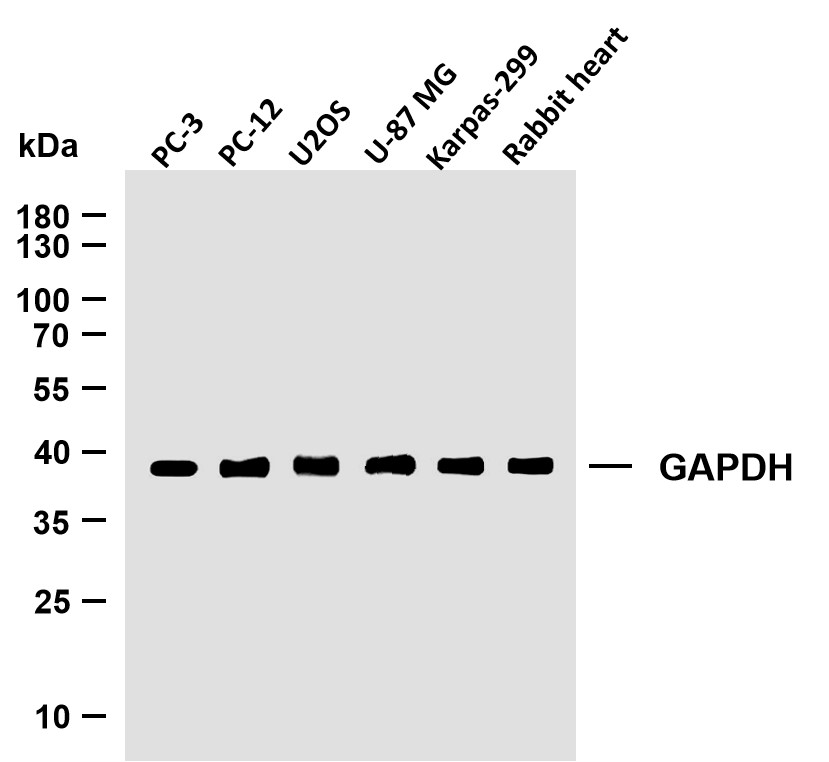
Catalog: YT0654
Size
Price
Status
Qty.
200μL
$450.00
4 weeks
0
100μL
$280.00
4 weeks
0
40μL
$150.00
4 weeks
0
Add to cart


Collected


Collect
Main Information
Target
Caspase-12
Host Species
Rabbit
Reactivity
Human, Mouse, Rat
Applications
WB, IHC, IF, ELISA
MW
50kD (Observed)
Conjugate/Modification
Unmodified
Detailed Information
Recommended Dilution Ratio
WB 1:500-1:2000; IHC 1:100-1:300; ELISA 1:40000; IF 1:50-200
Formulation
Liquid in PBS containing 50% glycerol, 0.5% BSA and 0.02% sodium azide.
Specificity
Caspase12 Polyclonal Antibody detects endogenous levels of Caspase12 protein.
Purification
The antibody was affinity-purified from rabbit antiserum by affinity-chromatography using epitope-specific immunogen.
Storage
-15°C to -25°C/1 year(Do not lower than -25°C)
Concentration
1 mg/ml
MW(Observed)
50kD
Modification
Unmodified
Clonality
Polyclonal
Isotype
IgG
Related Products
Antigen&Target Information
Immunogen:
The antiserum was produced against synthesized peptide derived from human Caspase12. AA range:50-99
show all
Specificity:
Caspase12 Polyclonal Antibody detects endogenous levels of Caspase12 protein.
show all
Gene Name:
CASP12
show all
Protein Name:
caspase12
show all
Other Name:
CASP12 ;
Inactive caspase-12 ;
CASP-12
Inactive caspase-12 ;
CASP-12
show all
Background:
Caspases are cysteine proteases that cleave C-terminal aspartic acid residues on their substrate molecules. This gene is most highly related to members of the ICE subfamily of caspases that process inflammatory cytokines. In rodents, the homolog of this gene mediates apoptosis in response to endoplasmic reticulum stress. However, in humans this gene contains a polymorphism for the presence or absence of a premature stop codon. The majority of human individuals have the premature stop codon and produce a truncated non-functional protein. The read-through codon occurs primarily in individuals of African descent and carriers have endotoxin hypo-responsiveness and an increased susceptibility to severe sepsis. Several alternatively spliced transcript variants have been noted for this gene. [provided by RefSeq, Feb 2011],
show all
Function:
proteolysis, apoptosis, virus-infected cell apoptosis, ER-nuclear signaling pathway, response to unfolded protein, cell death, response to organic substance, regulation of cell death, programmed cell death, death, endoplasmic reticulum unfolded protein response, cellular response to stress, cellular response to unfolded protein, response to endoplasmic reticulum stress, regulation of apoptosis, regulation of programmed cell death, response to protein stimulus,apoptosis in response to endoplasmic reticulum stress,
show all
Cellular Localization:
endoplasmic reticulum,IPAF inflammasome complex,NLRP3 inflammasome complex,AIM2 inflammasome complex,
show all
Tissue Expression:
Research Areas:
>>Protein processing in endoplasmic reticulum ;
>>Apoptosis ;
>>NOD-like receptor signaling pathway ;
>>Alzheimer disease ;
>>Amyotrophic lateral sclerosis ;
>>Prion disease ;
>>Pathways of neurodegeneration - multiple diseases ;
>>Hepatitis B
>>Apoptosis ;
>>NOD-like receptor signaling pathway ;
>>Alzheimer disease ;
>>Amyotrophic lateral sclerosis ;
>>Prion disease ;
>>Pathways of neurodegeneration - multiple diseases ;
>>Hepatitis B
show all
Reference Citation({{totalcount}})
Catalog: YT0654
Size
Price
Status
Qty.
200μL
$450.00
4 weeks
0
100μL
$280.00
4 weeks
0
40μL
$150.00
4 weeks
0
Add to cart


Collected


Collect
Recently Viewed Products
Clear allPRODUCTS
CUSTOMIZED
ABOUT US
Toggle night Mode
{{pinfoXq.title || ''}}
Catalog: {{pinfoXq.catalog || ''}}
Filter:
All
{{item.name}}
{{pinfo.title}}
-{{pinfo.catalog}}
Main Information
Target
{{pinfo.target}}
Reactivity
{{pinfo.react}}
Applications
{{pinfo.applicat}}
Conjugate/Modification
{{pinfo.coupling}}/{{pinfo.modific}}
MW (kDa)
{{pinfo.mwcalc}}
Host Species
{{pinfo.hostspec}}
Isotype
{{pinfo.isotype}}
Product {{index}}/{{pcount}}
Prev
Next
{{pvTitle}}
Scroll wheel zooms the picture
{{pvDescr}}



















